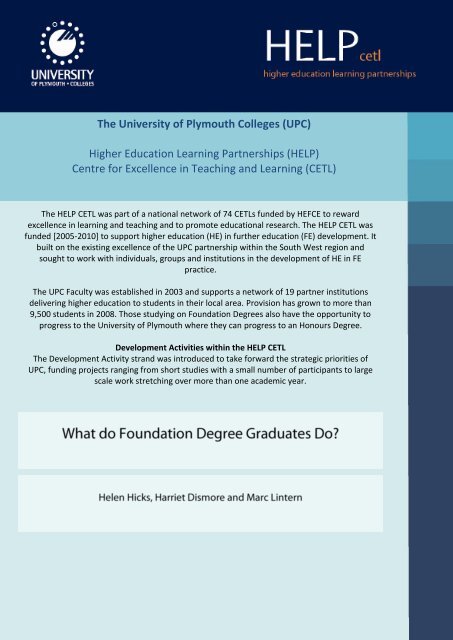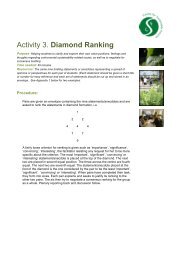What do Foundation Degree Graduates Do.pdf
What do Foundation Degree Graduates Do.pdf
What do Foundation Degree Graduates Do.pdf
- No tags were found...
You also want an ePaper? Increase the reach of your titles
YUMPU automatically turns print PDFs into web optimized ePapers that Google loves.
<strong>What</strong> <strong>Do</strong> <strong>Foundation</strong> <strong>Degree</strong> <strong>Graduates</strong> <strong>Do</strong>?Helen Hicks, Harriet Dismore and Marc Lintern, University of PlymouthABSTRACTThe foundation degree was introduced in 2001 with a view to addressing two main UKgovernment agendas, widening participation in higher education and improving higher levelskills. Both of these agendas have at their core an intention to increase levels of employment.Despite its importance in relation to these national agendas as well as for students themselves,research into foundation degree students has tended to focus upon their experience of studyingand their profile rather than on the destination and employability of foundation degreegraduates.This paper reports on a research study carried out over a two year period aiming to obtain aninsight into the progress of foundation degree students following completion of theirqualification. The findings show that most foundation degree students are motivated by theircareer and that a large number choose to continue their studies in order to obtain a Bachelorsdegree. Those who went on to complete a Bachelors degree were more likely to gain graduateoccupation. In general, older graduates were more likely to secure graduate employment thanyounger graduates. The paper concludes with suggestions for longitudinal studies trackinggraduates for longer periods and further research into employers‟ perceptions of thefoundation degree and its graduates.2
BACKGROUND<strong>Foundation</strong> degrees in the UK were introduced in 2001 as part of a move to encourage theeducation sector to engage more effectively with industry in the design and delivery oflearning opportunities, thereby bridging the gap between so-called „academic‟ and„vocational‟ learning. The following section explains how a range of political and economicdevelopments has influenced the delivery of higher education (HE) in further education (FE),particularly foundation degrees and to what extent this might affect the destinations andemployment outcomes of foundation degree graduates from the University of PlymouthColleges (UPC) partnership.<strong>Foundation</strong> <strong>Degree</strong><strong>Foundation</strong> degrees (FD) are one type of higher level qualification delivered in a FurtherEducation Institution (FEI), which began as an intermediate, work-related HE qualification.The rationale is for partnerships to design foundation degree courses together withuniversities, colleges and leading employers in the field so that education is linked tointermediate level occupations or the mid-skilled labour market.Designed as an endqualification in its own right attracting 240 credits (120 each at levels 1 and 2), it can becarried out full time over two years or part time over a longer period. It can also counttowards a full honours degree with a further 12–15 months of full-time study. Although eachfoundation degree is necessarily different in content, they place great emphasis uponemployer involvement, partnerships between FEIs and HEIs and work-based learning(Beaney 2006).On the whole, research into foundation degree students has tended to focus upon areas such astheir experience of studying the degree (<strong>Foundation</strong> Direct 2007; Tierney and Slack 2005) an<strong>do</strong>n their profile (Purcell et al. 2008; <strong>Do</strong>yle and O‟<strong>Do</strong>herty 2006), with little research3
completed on the destination of foundation degree graduates, whether it is directly intoemployment or further study. This is crucial if foundation degrees are to continue to be hailedas instrumental in providing employment opportunities via widening participation (DfES2003a, 2003b) and improving skills (UKCES 2009). It is also important for those studentswhose main motivation to study foundation degrees is for employment purposes (Tierney andSlack 2005).Widening participationFEIs are seen as playing a crucial role in helping the Government to increase their HE targetand are expected to, „encourage the development of HE that is flexible, responsive,employment focused, and informed by the workplace‟ (HEFCE 2006, 10). This was partly areflection of the success of FEIs in recruiting non-traditional students, but also because theywere well placed to recruit non-traditional students at a lower cost than higher educationinstitutions (HEIs) (HEFCE 2003).<strong>Foundation</strong> degrees directly contribute to widening participation in higher education byattracting people from a broad range of backgrounds, particularly low participationneighbourhoods and those over 21 years of age. In 2007-08 there were approximately 72,000students nationally enrolled on foundation degrees and the expectation is that this number willrise to 97,000 by 2010 (HEFCE 2008, 2). <strong>Foundation</strong> degree students also have an option tostudy at their local college and to „top up‟ their foundation degree to a Bachelors degree. 54per cent of students undertaking foundation degrees in 2003-04 went on to undertake full-timehonours degrees (HEFCE 2008).For some critics, the very process of widening participation threatens to further divide socialgroups. Wolf (2002), for example, claimed that education is used as a legitimate means of„ranking‟ individuals and as more people attain higher level qualifications, employers raise4
the entry threshold. In other words, the people suffering from grade inflation are the peoplewith the lowest levels of education to begin with. Bourdieu and Passeron (1990) also arguedthis point, stating that academic devaluation increases the significance of social and culturalcapital whilst simultaneously devaluing human capital.Employability and skills<strong>Foundation</strong> degrees were also deemed well placed for implementing the recommendations putforward in the Leitch 2006 report (DIUS 2007). This review reported that although betterskills are the key to greater social mobility and achieving higher productivity, the UK‟s skillsbase lags behind that of other advanced countries. Interestingly, it seems that little haschanged since this review according to a recent study carried out by UKCES (2009). Inresponse to this, the Government has committed itself to ensuring that in England by 2020,more than 90% of adults will have gained at least a level 2 qualification (equivalent to 5GCSEs at A*-C grade) and more than 40% of all adults to have a higher educationqualification (at level 4 and above) (DIUS 2007).Within higher education, the skills agenda has been criticised by those believing that itreflects a narrow view of educational aims (Morley 2001) and that emphasising the skills ofthe individual lacks recognition of wider social and economic inequalities by reinforcing anotion of individual responsibility (Moreau and Leathwood 2006).In fact, Brown andHesketh (2004) argue that discourse of employability itself encourages individuals to view thepersonal characteristics (social class, gender or race) as irrelevant.Despite these allegations, embedding employability into curriculum and pedagogy is nowregarded as key to developing skills, confidence and experiences among students from underrepresentedgroups (Thomas and Jones 2007). Arguably foundation degrees are the bestexample of this, offering work-based learning and links with employers.5Mason and
colleagues (2009) investigated the impact of employability skills initiative on graduate labourmarket performance and reported positive findings.They found that structured workexperience, as well as employer involvement in course design and delivery, had clear positiveeffects on the ability of graduates to find and secure employment. Whilst this study focusedat department level rather than at course level, the findings <strong>do</strong> provide clues about thepotential benefits of the foundation degree to graduate labour markets.More generally, research conducted into the destinations of graduates tends to paint a bleakpicture. For example, there is reportedly a substantial growth in the proportion of graduateswho are overqualified for their jobs (Green and Zhu 2008), which is known to have seriousimpact upon labour turnover, occupational choice and job satisfaction (Allen and Van derVelden 2001). Furthermore, opportunities for under-represented groups to succeed in thegraduate labour market still <strong>do</strong> not compare favourably with those from more privilegedbackgrounds (Thomas and Jones 2007). This and other work supports the argument that„cultural capital‟ such as parental income and gender, continues to impact upon employment(Grayson 2004).One way to examine the extent to which the foundation degree succeeds in meeting the skillsand widening participation agendas is to explore the destinations of the foundation degreegraduates. This study draws upon the different types of job provided by Elias and Purcell(2004). These are „traditional‟ graduate jobs, historically accessed via an undergraduatedegree (e.g. lawyers), „modern‟ graduate jobs, for which an undergraduate degree became thenormal route during the 1960s (e.g. primary school teachers), „new‟ graduate jobs where theroute has recently changed e.g. marketing and sales managers, „niche‟ graduate jobs, wheremost workers <strong>do</strong> not have degrees but certain roles will have e.g. hotel managers and nongraduatejobs, which rarely required the skills of a graduate.6
METHODSThe University of Plymouth Colleges (UPC) partnership used for this investigation is locatedin the South West of England. The most rural of six HEIs in the region, the University ofPlymouth supports a network of 19 partner institutions including further education collegesand other organisations such as the Royal Navy.The UPC partnership covers a widegeographic area with large travel times between institutions. Partners are often located inareas with little traditional HE availability. Reflecting the national trend, provision has grownto more than 10,000 students in 2009 (of which 7,000 are full time equivalent). Thosestudying foundation degrees have the opportunity to progress to the university where they canprogress or „top-up‟ to an honours degree.This paper reports on a research study carried out over a two year period aiming to obtain aninsight into the progress of foundation degree students following completion of theirqualification. In order to achieve this aim, the study sought to address the following researchquestions:<strong>What</strong> <strong>do</strong> foundation degree graduates <strong>do</strong> immediately following completion?How <strong>do</strong> different demographic profiles effect destinations?How <strong>do</strong> the destinations of foundation degree students at the University of Plymouthcompare with those nationally?How <strong>do</strong>es the destination of foundation degree graduates compare with that ofBachelors degree graduates in the labour market?Information for this study was obtained using the annual Destination of Leavers from HigherEducation Survey (DLHE) survey. For graduates of the University of Plymouth data wereobtained for three years from 2003-04 to 2005-06 and national data was purchased from theHigher Education Statistics Agency (HESA) for 2005-06. The DLHE survey contacts and7
surveys students six months after graduation using a standard metho<strong>do</strong>logy prescribed by(HESA). Response rates for the DLHE survey itself are targeted at 80% that is commonlyachieved by institutions including the University of Plymouth. DLHE responses may be fromthe graduate or a close family member of the graduate.Additional information fromUniversity of Plymouth graduates was collected using questionnaires designed for thisresearch which were administered by telephone surveyors. Any additional questions asked inby telephone survey for this research were asked of only the graduates themselves and soresponse rates were considerably lower (59% of graduates surveyed).RESULTSThe results from this study pertain to the questions asked about why studentschose to study a foundation degree, what they did immediately followingcompletion and why they chose to continue their studies or progress straightinto employment. The following section explores how employment is affected byage and gender and how the destinations of foundation degree graduatescompare with those nationally and with the destinations of Bachelor degreegraduates.Choosing a foundation degreeOverall, 82% (370) of graduates surveyed in this study stated that their main reason forchoosing a foundation degree was that „it fitted (their) career plans exactly‟. This echoes thefindings of Brooks and Everett (2009) who, on the basis of narratives with 90 young adults,found that „employability‟ was a key driver of further learning, particularly as a means ofbolstering their labour market position. It also supports earlier research finding that, on the8
whole, working class students regarded a degree as a means to an end (Leathwood andO‟Connell 2003), compared to middle class students whose motivation is for the socialexperience just as much as their studies (Crozier et al. 2008).Other responses to the question included that it was because the course was „available locally‟(12%) and „because they had suitable entry grades‟ (3%). Indeed, the flexibility of the courseand the convenience of the colleges were also mentioned. Convenience was explained invarious ways, such as a simple application process or proximity to a bus route. Reflectingother work on widening participation with young people (Dismore 2009), these responseshelp to illustrate the complexities of decision-making among those students considered nontraditional.Many responses related to the cost of studying, such as travel considerations an<strong>do</strong>pting to study part time to alleviate financial hardship, which as Archer (2006) found, can bea source of constant anxiety.5% of graduates said that their reason had been something else. The most common of theseincluded that the foundation degree gave them an option to leave after two years with aqualification and that the foundation degree was a better option for financial reasons (i.e.being cheaper). Many graduates also said that the attraction was an interest in the subject,whilst others, including an FDA Adventure Education Management student, valued thepractical experience and work based learning.<strong>Foundation</strong> degree graduates in further studyAs the foundation degree is a stand alone qualification, graduates may choose to enteremployment directly after graduating.At a national level, over half the students whoqualified with a foundation degree in 2004-5 went on to study an honours degree in 2005-6(HEFCE 2008). Of those participating in this study, a slightly higher proportion, around two9
thirds (65%) of foundation degree graduates from the UPC partnership continued their studiesin 2004-05.When surveyed, the main reason foundation degree graduates gave for „topping up‟ was thatthis was believed to be either „essential‟ or „desirable‟ for their career. More than half ofthose in further full time study said that they had continued their studies to either developfurther skills or knowledge or change or improve their career options. To a certain extent, thisreflects the policies and initiatives designed to increase participation in HE. As RaisingExpectations stated, it is assumed that individuals who remain in education for two yearspost-sixteen „will also become more productive economically‟ (DfES 2007: 11). At the sametime, the responses also resonate with the skills agenda and specifically the belief thatimproving skills is required to maintain international competitiveness (DIUS 2007).A relatively high percentage of participants (37%) said that they were either interested in thecourse or wanted to carry on because they enjoyed studying (Table 1). This is a positivefinding in light of the increasing emphasis by government policy upon lifelong learning(Knapper and Cropley 2000). In fact, few responses were negative and less than 5% extendedtheir studies because they had been unable to find work.Table 1: Reasons for foundation degree graduates continuing to studyReason given for studying No. %“To develop a broader or more specialist range of skills or knowledge” 30 27.8“To change or improve my career options” 27 25.0“Because I was interested in the content of the course” 22 20.4“Because I had enjoyed the first course and wanted to continuestudying”18 16.7“I had been unable to find another job” 4 3.7“I wanted to go on being a student/I wanted to postpone job hunting” 3 2.8“Because it was a requirement of my employment that I did” 1 0.910
Employment benefits of a Bachelors degree<strong>Foundation</strong> degree graduates who had decided to „top up‟ to a Bachelors degree were morelikely to be in a graduate occupation (42.4%) six months after graduating, than theircontemporaries who had spent eighteen months in the labour market after graduating fromtheir foundation degree (38.6%). Those who decided not to „top up‟ and who graduated witha foundation degree only, were more likely to be in non-graduate employment immediatelyfollowing completion (67.4%), although levels of unemployment were similar for all threegroups. It is important to remember that first destinations at six months give only anindication of the value of higher education and that many graduates can take up to two and-ahalfyears to find jobs that use their graduate level skills (Elias et al. 1999). Despite this fact,these results <strong>do</strong> suggest that those with Bachelor degrees are more likely to find a higher levelof employment sooner than those with foundation degrees.<strong>Foundation</strong> <strong>Degree</strong> graduates in employmentFewer graduates chose to work after graduation than continue their studies. Of those whowere in employment, over half (65%) said that they had taken their job because it „fitted theircareer plans exactly‟. 11% (14 graduates) took their jobs to get more work experience, half forspecific work experience and half for general work experience. Although nearly a quarter ofgraduates were working for „financial reasons‟, no graduates were working because they felt„it was their only available option‟. However, although 65% said they were working in a jobthat fitted their career plans exactly, only one third were in graduate occupations as defined byElias and Purcell (2004).Few studies have explored how foundation degrees are perceived by employers beyondexisting engaging employers involved in designing and delivering foundation degrees(Benyon et al. 2009). However, employer perception might be one contributing factor why11
few foundation degree graduates are employed at graduate level. Marketing and branding ofthe foundation degree has been a concern in the past especially in relation to trust andconfidence (Rowley 2005). As discussed by Gibbs (2002), applying the term „foundationdegree‟ suggests that the benefits accrued by the Bachelor graduates will, to some extent, betransferred to foundation degree graduates. Indeed, referring to foundation degree students as„graduates‟ could also be confusing to those unfamiliar with the foundation degree, althoughthis is the term used widely by higher education agencies such as Prospects. Conversely,students from under-represented groups may wrongly assume that they are unsuitable forgraduate posts (Greenbank 2009).Many foundation degree graduates (59%) responded that they were in employment „that fitstheir career plans exactly‟ but which also did not require them to relocate. Many otherfoundation degree graduates had also not relocated, but had taken their jobs primarily forfinancial reasons (23%). The foundation degree graduates in this study who were employedappeared to find employment they were satisfied with, without relocating (Figure I). As otherwork has testified, there is a long-established tradition of students in the UK attending HEinstitutions away from their home region, which it is claimed, has academic, personal andmaturation benefits (Croot and Chalkley 1999) and an increase in graduate salary (McGregoret al. 2002). However, for students from non-traditional backgrounds there are often anumber of barriers to participating in HE that may impinge on relocation, such as familycommitments and financial situations (Archer, 2006). It is also argued that consequently,these graduates may be less able to capitalise on career opportunities (<strong>Do</strong>lton and Silles2001).12
70%60%50%40%30%Did not relocateRelocated20%10%0%Financial reasonsFitted career plansexactlyGeneral workexperienceSpecific workexperienceFigure I: Reasons for choosing to enter employment according to relocationEffect of gender on employmentThere appears to be a distinct difference between genders in the post-graduation employmentof foundation degree graduates (figure II). On the whole, males were more likely to continuetheir studies compared to females and females are more likely to enter full or part-time work(23% of men are in full-time or part-time work as opposed to 41% of women). This isparticularly interesting in light of the work carried out by Archer (2006) who found thatgenerally, males felt they would suffer a loss in power and status by engaging in „un-manly‟„middle class‟ study.However, Archer also reported that for many females, universityparticipation was positioned as difficult due to external factors such as family and childcareduties. Particularly in traditionally „male‟ jobs, there is evidence that females perceive thatthey have to choose between career development and family-building (Purcell et al. 2006).This may help explain the trend of females entering work rather than continuing to study. It isalso important to note that completing the Bachelors degree required full time study and so13
part time students would have to change mode of study if they wished to continue. For manyfemales this may have not have been an option.The differences may also be due to gender influences and subject choice. This is exemplifiedby the pre<strong>do</strong>minantly female graduates from FDA Education (teaching assistants) whosestudy would almost inevitably lead straight to non-graduate level part time work. As such,this is consistent with the report of Moreau and Leathwood (2006) who referred to the impactof gender, as well as social class and ethnicity, upon opportunity in the workplace.Female - FD graduatesMales - FD graduates25%13%9%45%2%4%4%5%3%2%16%63%2%7%14
Figure II: Employment circumstances according to qualification and genderEffect of age on employmentIn the academic year 2005-6, 65% of foundation degree students were aged 21 or over whenthey started the course (HEFCE 2008). As this suggests, foundation degrees nationally seemto be attracting older students, although there are complexities within this pattern (Beaney2006). Both for Plymouth graduates and foundation degree graduates nationally, furtherstudy became less common with increasing age. Older graduates were about three times morelikely to enter full-time employment than younger graduates (Figure 3) and younger graduateswere three times more likely to continue studying than older students.The reason(s) why older students were more likely to enter work than study towards aBachelors degree may be because they were already in employment studying part time. Olderstudents may also have had other commitments or have been also less able to relocate, asdiscussed above. As Bufton (2006) wrote, mature, working class students‟ experiences canoften be permeated by feelings of being an outsider which may dissuade them fromprogressing to a university.In particular, academic language, style and stance can beregarded as barriers to overcome.The likelihood of graduates obtaining graduate-level employment appeared to be verydependent on the age of the graduate. Similar to a study on age and the labour market (Purcelland Wilton 2007), younger graduates (both from Plymouth and nationally) were more likelyto be in non-graduate employment. 71% of graduates aged 22 and under from Plymouth and51% of those nationally were in non-graduate employment, compared to 29% and 31%respectively of graduates aged over 55 years old (Figure V). Again, this may result from15
older students already occupying graduate jobs and studying a part time foundation degree.However, it <strong>do</strong>es reflect Purcell and Wilton‟s finding that mature graduates were less likely toenter non-graduate employment as a short-term expedient than their younger counterparts.Whilst obtaining traditional and modern graduate jobs more likely to be occupied by oldergraduates, new graduate jobs such as marketing and sales managers were more evenlydistributed across age groups for both graduates from the University of Plymouth andnationally (See Figure V). This is interesting given the interviews carried out by Purcell andWilton (2008) finding that mature learners assumed that their maturity and experiencerendered them inappropriate for „new‟ graduate jobs.It is possibly that increasinglyfoundation degree graduates from non-traditional backgrounds are entering the „new‟ jobgraduate market, regardless of age purely in order to secure employment.Comparing destinations of foundation degree students with those nationallyThe South West is a region <strong>do</strong>minated by micro businesses, employing less than ten people,and has a largely rural landscape, particularly as you move further west away from the mainurban centres of Bristol and Bath (Perryman et al. 2003). It is generally perceived bygraduates to be a nice place to live and to study but not to be a good place to start a graduatecareer (Perryman et al. 2003). Despite this, over 10,000 new graduates find work in theregion each year (HESA 2009).The destinations of graduates from foundation degrees from the UPC partnership are notrepresentative of the destinations of foundation degree graduates nationwide, as can be seenfrom Figure III below. Although, levels of part time employment and levels of selfemploymentare similar for each age group both nationally and for the UPC partnership.<strong>Graduates</strong> under 22 also show very similar levels of full time employment, but for oldergraduates differences are soon noticable. Levels of full time employment are much higher for16
foundation degree graduates nationally than for UPC partnership graduates. Conversely,levels of foundation degree graduates in further study are appreciably higher for the UPCpartnership than found nationally.0.60.50.40.30.20.1022 and under 23 to 25 26 to 36 37 to 45 46 to 55 56 to 98Employed full time: PlymouthEmployed full time: NationalEmployed part-time: PlymouthEmployed part-time: NationalStudying: PlymouthStudying: NationalFigure III: Comparison of the destinations of foundation degree graduates in Plymouth withthose nationally according to agePlymouth foundation degree graduates were less likely than the UK average to be employedin a graduate occupation (Figure IV), although the rate for males and females in non-graduate17
level occupations was more similar for graduates from Plymouth than for the UK generally.Plymouth seemed to have fewer graduates in new graduate occupations than generally acrossthe UK. Plymouth also had greater numbers of graduates in non-graduate jobs than nationally,about half as many again. This did not appear to be wholly due to the higher numbers of UPCpartnership graduates topping-up.Figure IV: Comparison of employment type for foundation degree graduates inPlymouth with those nationallyAs the data shows, employment across all UK graduates appears to be affected by age, witholder students being more likely to be in graduate employment than younger graduates. Thereis a concurrent increase in students in traditional, modern and new graduate jobs as ageincreases. The variation across age groups is more prominent for graduates of the UPCpartnership than for graduates nationally.18
Figure V: Comparison of employment type at Plymouth and nationally according to ageSatisfaction of graduates in employmentReassuringly, despite the relatively low proportion in graduate jobs, foundation degreegraduates surveyed expressed high levels of satisfaction about their employment. Two-thirdsof the participants said that their job fitted their career plans exactly. As such, this datacontradicts an earlier study claiming that students suffer disappointment and disillusionmentwith education as they enter the labour market in search of work (Dwyer and Wyn 2001).Some students may also have made a compromise between their career expectations in favourof lifestyle or personal commitments.19
Importantly, many foundation degree graduates in non-graduate level employment were foundto be employed in the industry sector of their foundation degree. For example, a graduate ofFDSc Golf Operations Management was employed as a Tour Administrator for a golfingholiday company or a graduate of FDA Multimedia Design working as a PublishingProduction Assistant. It is possible that, despite a mismatch in terms of their education andjob, they remain positive because there is no mismatch in skill. Allen and Van der Velden(2001) undertook a study to examine the relation between educational mismatches and skillmismatches.They found that skill mismatches were a much better predictor of jobsatisfaction than educational mismatches.Finally, it is possible that graduates in this study were satisfied with non graduateemployment because they had low expectations of the jobs available to them, or that theysimply expected to reach higher level jobs later. After all, studies of graduate employmentsuggest that many graduates take up to two and-a-half years to find jobs that use theirgraduate level skills (Elias et al. 1999). There is also a view that graduates will develop theirroles more effectively than non-graduates so that a so-called „non-graduate‟ role evolves intoone suited for the graduate (Bowers-Brown and Harvey 2004).DISCUSSIONThe assumption outlined in the government white paper The Future of Higher Education isthat improving skills and widening participation can be achieved via foundation degrees,which will in turn lead to increased employment benefits. As it states, „the benefits of highereducation for individuals are far-reaching. On average, graduates get better jobs and earnmore than those without higher education‟ (DfES 2003b). This is certainly the response ofmost participants involved in this study, who cited their career as a reason to undertake thefoundation degree in the first place, the main reason to continue to a Bachelors degree and theprincipal reason to embark straight into employment.20This is understandable if most
foundation degree graduates come from lower socio-economic groups and are responding tothe proliferation of government policies and initiatives highlighting the concept of theknowledge economy (Warhurst 2008).This paper demonstrates that whilst, on the surface, foundation degrees are contributing toboth the widening participation agenda and the skills agenda, when destination andemployment outcomes are examined more closely, there is a much more complex picture.Many of the foundation degree graduates were not obtaining graduate level jobs, especiallythe younger groups. As yet, the exact reasons for this are unclear, although the aspirations ofyounger foundation degree students may be one reason. However, as Elias and colleagues(1999) pointed out, these graduates may take longer to find jobs that use their graduate skillsand may even evolve their non-graduate role into one suitable for graduates (Bowers-Brownand Harvey 2004). On the whole, older graduates were more likely to obtain graduate leveljobs, particularly traditional and modern jobs. However, Purcell and Wilton (2008) found thatalthough mature learners gained a pay premium for their degree, their earnings growth wasgenerally lower than that of younger graduates. It may be that further longitudinal studieswould uncover these same trends for foundation degree graduates.It was somewhat surprising to find that of the participants in this study, mainly malefoundation degree graduates went on to complete a Bachelors degree. This may be due to thehistorically gendered subjects undertaken by the females which would lead them straight toemployment (e.g. Education) and family commitments which would make full time study ofthe Bachelors degree difficult. For both females and males, relocation did appear to be afactor in decision making. Whilst this has been found to be the case among other studentsfrom non-traditional backgrounds (Archer 2006), this restriction may impinge upon theopportunities both to continue further study and to capitalise on career prospects.21
When levels of employment for foundation degree graduates were compared to nationalfigures, they were found to be generally higher nationally than for UPC partnership graduatesand levels of further study were found to be higher at Plymouth than nationally. This may bebecause the South West region has few large employers and foundation degree graduates arereluctant to relocate in order to find work. It is also possible that many foundation degreegraduates are studying part time and return to the same workplace after completion.As discussed, the perceptions of foundation degrees among employers is an area that requiresfurther research, especially with those employers not already involved in designing anddelivering courses. This will then help to answer questions about the impact of the foundationdegree brand, employers‟ experiences of employing foundation degree graduates and whatskills they perceive foundation degree graduates to offer to the labour market. It would also beuseful to ascertain to what extent the labour market still operates according to „culturalcapital‟ (Grayson 2004), thereby reinforcing the traditional social, gender and age divides inthe workplace (Wolf 2002; Thomas and Jones 2007).Despite the fact that many foundation degree graduates were in non-graduate roles, theyexpressed high levels of satisfaction about their employment. This may be due to lowaspirations among students from under-represented groups (Leathwood and O‟Connell 2003).Alternatively, this may simply be because skill mismatches are a better predictor of jobsatisfaction than education mismatches as Allen and Van der Velden (2001) reported. Inother words, graduates were perhaps happiest in their jobs using the skills obtained in theirfoundation degree regardless of the education level reached. Further research is needed intothe motivations and experiences of foundation degree graduates at work to ascertain whetherthis is the case.22
REFERENCESAllen, J. and R. Van der Velden. 2001. Educational mismatches versus skill mismatches:effects on wages, job satisfaction, and on-the-job search. Oxford Economic Papers, 3:434-452.Archer, L. 2006. „Round Pegs into Square Holes? Critical issues for the wideningparticipation agenda‟ in D. Jary and R. Jones (Eds) Perspectives and Practice inWidening Participation in the Social Sciences,33-61, Birmingham: C-SAP.Beaney, P. (Ed.) 2006. Researching foundation degrees: Linking research and practiceLon<strong>do</strong>n: FDF.Benyon, J., McKee, B., Crewe, E. and Morris, K. 2009. Employers‟ engagement withfoundation degrees. Leicester: Learning and Skills Council.Bourdieu, P. and J. Passeron. 1990. Reproduction in education, society and culture. Lon<strong>do</strong>n:Sage.Bowers-Brown, T. and L. Harvey. 2004. Are there too many graduates in the UK? A literaturereview and an analysis of graduate employability, Industry and Higher Education,August: 243-254.Brooks, R. and G. Everett. 2009. Post-graduate reflections on the value of a degree. BritishEducational Research Journal, 35, no. 3: 333-349.Brown, P. and Hesketh, A. 2004. The mismanagement of talent: Employability and jobs in aknowledge economy Oxford: Oxford University Press.Bufton, S. 2006. Learning to play the game: Mature, working-class students in highereducation, in D. Jary and R. Jones (Eds) Perspectives and Practice in WideningParticipation in the Social Sciences: 87-116, Birmingham: C-SAP.Croot, D. and B. Chalkley. 1999. Student recruitment and the geography of undergraduategeographers in England and Wales, Journal of Geography in Higher Education, 23,no. 1: 21-47.23
Crozier, G., D. Reay., L. Colliander and J. Grinstead. 2008. Different strokes for differentFolks: Diverse students in diverse institutions – experiences of higher education,Research Papers in Education 23, no. 2: 167-177.Department for Innovation, Universities and Skills (DIUS) 2007. World class skills:Implementing the Leitch Review of Skills in England. Lon<strong>do</strong>n: The Stationary Office.Department for Education and Skills (DfES). 2003a. 21 st century skills: Realising ourpotential, Lon<strong>do</strong>n: DfES.Department for Education and Skills (DfES). 2003b. The Future of Higher Education,Lon<strong>do</strong>n: DfES.Department for Education and Skills (DfES). 2007. Raising expectations: Staying ineducation and training post-16, Lon<strong>do</strong>n: DfES.Dismore, H. 2009. Widening participation: <strong>What</strong> can we learn from young people? WideningParticipation and Lifelong Learning, 11, no. 1:17-27.<strong>Do</strong>lton, P. and M. Silles. 2001. Over-education in the graduate labour market: Someevidence from the Alumni data. [Discussion Paper No. 9] Lon<strong>do</strong>n: Lon<strong>do</strong>n School ofEconomics, Centre for the Economics of Education.<strong>Do</strong>yle, M. and E. O‟<strong>Do</strong>herty. 2006. <strong>Foundation</strong> degrees and widening participation: Earning,learning and public sector modernisation. Widening Participation and LifelongLearning, 8, no.1:.4-13.Dwyer, P. and J. Wyn. 2001. Youth, education and risk: facing the future. Lon<strong>do</strong>n:RoutledgeFalmer.Elias, P., A. McKnight, J. Pitcher, K. Purcell and C. Simm 1999. Moving on: Graduatecareers three years after graduation. Warwick: University of Warwick, Institute foremployment research.Elias, P. and K. Purcell 2004. SOC(HE): A classification of occupations for studying thegraduate labour market, from graduate occupations, Warwick: University of Warwick,Institute for employment research.24
<strong>Foundation</strong> Direct. 2007. Impact of foundation degrees: The student experience. Retrieved01/10/08 from http://www.fdf.ac.uk/files/<strong>Foundation</strong>Directreport.<strong>pdf</strong>.Gibbs, P. 2002. Marketing issues for non-degree United King<strong>do</strong>m higher education: The caseof foundation degrees, Journal of Vocational Education and Training, 54, no. 2: 237-248.Grayson, J. 2004. Social dynamics, university experiences and graduates' job outcomes.British Journal of Sociology of Education, 25, no. 5: 609-628.Green, F. and Y. Zhu. 2008. Department of economics discussion paper 08/03. Retrievedfrom http://www.kent.ac.uk/economics/<strong>do</strong>cuments/research/papers/2008/0803.<strong>pdf</strong>Greenbank, P. 2009. An examination of the role of values in working-class students‟ careerdecision-making, Journal of Further and Higher Education, 33, no. 1: 33-44.Higher Education Funding Council for England (HEFCE). 2003. The future of highereducation. Retrieved 3/10/08 fromhttp://www.dcsf.gov.uk/hegateway/strategy/hestrategy/.Higher Education Funding Council for England (HEFCE). 2006. Higher education in furthereducation colleges: Consultation on HEFCE policy. Retrieved 3/10/08 fromhttp://www.hefce.ac.uk/pubs/hefce/2006/06_48/06_48.<strong>pdf</strong>.Higher Education Funding Council (HEFCE). 2008. <strong>Foundation</strong> degrees: Key statistics 2001-2 to 2007-8. Retrieved 02/10/08 fromhttp://www.hefce.ac.uk/pubs/hefce/2008/08_16/.Higher Education Statistics Agency (HESA). 2009. Destinations of leavers from highereducation institutes 2007-2008. Cheltenham: HESA.Knapper, C. and A. Cropley. 2000. Lifelong learning in higher education, 3 rd edition, Lon<strong>do</strong>n:Kogan Page.Leathwood, C. and P. O'Connell. 2003. “It's a struggle”: The construction of the “newstudent” in higher education, Journal of Education Policy 18, no. 6: 597-615.25
Mason, G., G. Williams and S. Cranmer. 2009. Employability skills initiatives in highereducation: <strong>What</strong> effects <strong>do</strong> they have on graduate labour market outcomes? EducationEconomics, 17, no. 1: 1-30.McGregor, P., R. Thanki and P. McKee. 2002. Home and away: Graduate experience from aregional perspective, Applied Economics 34: 219-230.Moreau, M.-P. and C. Leathwood. 2006. <strong>Graduates</strong>‟ employment and the discourse ofemployability: A critical analysis, Journal of Education and Work 19, no. 4: 305-324.Morley, L. 2001. Producing new works: Quality, equality and employability in highereducation, Quality in Higher Education, 7, no. 2: 131-138.Perryman, S., E. Pollard, J. Hillage and L. Barber. 2003. Choices and transitions: A study ofthe graduate labour market in the south west, HERDA-SW.Purcell, K. and N. Wilton. 2007. Hard lessons for lifelong learners? Age and experience in thegraduate labour market, Higher Education Quarterly 61, no. 1: 57-82.Purcell, K., P. Elias, R. Ellison, G. Atfield, D. Adam and L. Livanos. 2008. Applying forhigher education - the diversity of career choices, plans and expectations. Findingsfrom the First Futuretrack Survey of the ‘Class of 2006’ applicants for HigherEducation.Purcell, K., P. Elias and N. Wilton. 2006. Looking through the glass ceiling: A detailedinvestigation into the factors that contribute to gendered career inequalities. Aresearch project undertaken as part of the UK Higher Education European SocialFund Objective 3 Programme - Research into equal opportunities in the labourmarket. ESF/IER.Rowley, J. 2005. <strong>Foundation</strong> degrees: A risky business? Quality Assurance in Education, 13,no 1: 6-16.Thomas, L. and R. Jones. 2007. Embedding employability in the context of wideningparticipation, York: HEA.26
Tierney, S. and K. Slack. 2005. Learning journeys: The experiences of students workingtowards a foundation degree, Journal of Vocational Education and Training, 57, no.3: 375-388.United King<strong>do</strong>m Commission for Employment and Skills (UKCES). 2009. Ambition 2020:World class skills and jobs for the UK. Lon<strong>do</strong>n: UKCES.Warhurst, C. 2008. The knowledge economy, skills and government labour marketintervention, Policy Studies, 29 (1), 71-86.Wolf, A. 2002. <strong>Do</strong>es education matter? Lon<strong>do</strong>n: Penguin.Target AudienceThis report presents information about a research and development activity carried out byHE in FE professionals.The content has four key audiences:• HE in FE academic and support service practitioners undertaking educational researchand scholarly activity;• Managers, services or institutions involved in promoting or supporting the developmentof research and development in an HE in FE context;• Researchers investigating research and development in an HE in FE context;• Institutions involved in the enhancement and or dissemination of research anddevelopment in an HE in FE context.ContactUniversity of Plymouth CollegesUniversity of PlymouthDrake CircusPlymouthPL4 8AAtel: +44 (0) 1752 587500email: upc@plymouth.ac.ukweb: www.plymouth.ac.uk/upcIf you require any part of this report in larger print please contact:Disability ASSISTTel: +44 (0) 1752 587656Email: das@plymouth.ac.uk27














